Find below the list of 16 epic festivals of Thailand throughout the year
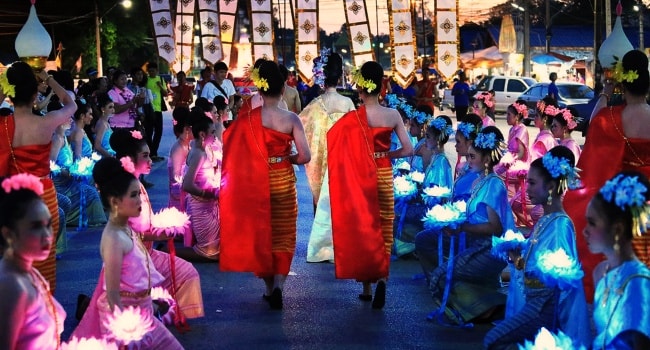
16 Magical Festivals of Thailand
 Jolie LIEM
Jolie LIEM
 05/03/2026
05/03/2026
Thailand never fails to amaze its thousands of visitors with the most vibrant festivals that are sure to delight them by offering glimpses into the heritage and traditions of the country. Each month offers an exciting opportunity to be a part of these festivals. From kids to adults and old-aged people, locals have the time of their lives during these festivities. Considered to be one of the best ways to relish a memorable time in what is already known as an incredible country, these festivals in Thailand are the most popular ones to be a part of.
- Top 16 magical festivals in Thailand
- Songkran Water Festival during Thai New Year
- Yi Peng & Loy Krathong Festival
- Phi Ta Khon - the Ghost Festival
- Phuket Vegetarian Festival (the Nine Emperor Gods Festival)
- The Lopburi Monkey Buffet Festival
- River Kwai Bridge Week
- Boon Bang Fai - Rocket Festival
- Phimai Festival & Long-Boat Race
- Chinese New Year
- Buffalo Racing Festival (Wing Kwai)
- Candle Festival
- Surin Elephant Festival
- Mekong Naga Fireballs
- Mother's Day and Father's Day
- Full Moon Parties
- Wai Kru Day
- Songkran Water Festival during Thai New Year
- FAQs about Festivals in Thailand
Top 16 magical festivals in Thailand
Songkran Water Festival during Thai New Year
Do you like the idea of a giant, three-day water fight? Then you’ll love the most famous of Thailand festivals: Songkran. All over the country locals and tourists alike take to the streets to attack each other with water guns, hoses, and buckets of icy water. This is all to celebrate the start of the Thai New Year, which is thought of as a time of cleansing and renewal. This is symbolized by pouring water and smearing white talcum paste on people to bring luck and prosperity.
Songkran is a major event in the Buddhist calendar, making it the most important Thai festival. During Songkran, Buddhists visit temples to pray, light candles and make merit as well as cleanse each other with water. On the main day of celebrations, a procession of Buddha statues, monks and floats passes through the streets and Buddhists pour water over the statues. Tourists are welcome to take part in Songkran celebrations and are even singled out for special drenching by Thai locals.
When is Songkran?
The dates for Songkran were traditionally determined by the Thai lunar calendar. In Sanskrit, Songkran means ‘astrological passage’, the time when the sun passes from one sign of the zodiac to another. Nowadays, Songkran is always celebrated on the 13th – 15th April, which is the hottest month in Thailand and the end of the dry season. The perfect time for a water fight!
Where can you celebrate Songkran?
Though celebrated throughout the country, there are bigger cities in the city of Bangkok, Chiang Mai, Phuket, or Pattaya
Here is the dedicated article about Songkran Festival during Thai New year
Yi Peng & Loy Krathong Festival
There are 2 festivals of light that are usually mixed up by tourists visiting the country during November: Yi Peng Festival & Loy Krathong Festival.
Yi Peng Festival
Imagine thousands of paper lanterns, lit by flickering candles, floating into the night sky against a full moon. This moving spectacle is the highlight of the Yi Peng festival and thousands of people flock to northern Thailand every November to witness it. However, the lantern release is just one part of the three-day Buddhist festival. Celebrations also include religious events, lantern displays, music, parades, fireworks and food, making Yi Peng one of the most exciting Thailand festivals.
Most importantly, Yi Peng is a time for Buddhists to release bad memories, make wishes for the future and pay respect to Buddha. The act of releasing a lantern symbolises letting go of the past and moving from darkness into light. It’s an ancient, sacred ritual which originated in the Lanna (northern Thai) kingdom. Traditionally, only monks released lanterns but today anyone can take part in the festivities, provided they are respectful.
Yi Peng is often confused with a completely separate, unrelated event which is held in a nearby town called Mae Jo. The Mae Jo lantern release used to be part of the traditional Khatina ceremony held in the town, whereby Thai Buddhists donate robes and money trees to monks as a way of making merit. When the ceremony became flooded with visitors, the event organisers set up a separate ticketed lantern release for tourists, which costs between $100 and $400 to attend. Alternatively, you can witness thousands of floating lanterns for free at the Yi Peng festival.
When is Yi Peng?
Yi Peng is another Thai festival which falls during the full moon of the 12th month of the Thai Lunar Calendar. This occurs around November but the exact date changes each year. Please check with us for the exact date of each year.
Where can you celebrate Yi Peng?
Yi Peng is celebrated throughout northern Thailand but the most famous festivities take place in Chiang Mai. The best areas to watch the lantern releases are around the city moat and the Ping River, as well as Wat Chedi Luang and Wat Dan Tao temples.
Here is the dedicated article about Thailand Yi Peng Festival in Chiang Mai
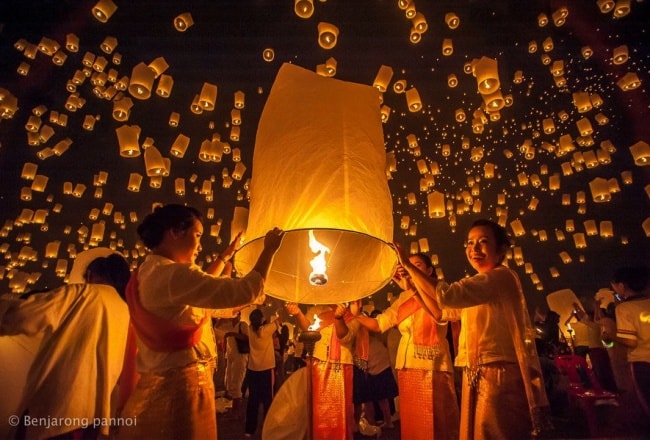
Loy Krathong Festival
During Loy Krathong, people all over Thailand gather by the water after dark to release floating baskets (Krathongs) filled with burning candles. As the rafts drift away they carry with them a clipping of the owner’s hair or nails to symbolise letting go of bad luck and negative thoughts. Flowers and coins are also placed in the baskets to give thanks to the water goddesses for providing rain during the rice harvest season. The flickering candle itself pays respect to Lord Buddha.
Loy Krathong has evolved into one of the largest festivals in Thailand. The three-day event is filled with parades, beauty contests and firework displays. Krathongs are traditionally made from banana tree trunks or lilies. In Bangkok, there’s a river parade of large-scale Krathongs made by government offices and businesses, with a prize for the most creative design. Loy Krathong is closely tied to Chiang Mai’s Yi Peng festival as it occurs on the same night and focuses on the same Buddhist principles of releasing the past and making wishes for the future.
When is Loy Krathong?
Loy Krathong falls in November, during the 12th month of the lunar calendar on the night of a full moon. The dates vary each year please check with us for more detail.
Where can you celebrate Loy Krathong?
Loy Krathong is one of the most celebrated Thailand festivals. In Bangkok there is a huge opening ceremony on the Chao Phraya River and the historic town of Sukhothai is also renowned for its festivities. In Trat, a small town near Myanmar, locals use coconut shells for Krathongs, which they string together to make beautiful chains. Since Loy Krathong falls on the same night as Yi Ping, in Chiang Mai you can experience both floating sky and water lanterns at once.
Here is the dedicated article about Thailand Loy Krathong Festival
Phi Ta Khon - the Ghost Festival
During the ghost festival, the quiet farming village of Dan Sai is transformed by colourful, masked spirits who dance and parade through the streets. The three-day Thai festival is a re-enactment of a Buddhist story and a celebration of animist reincarnation beliefs. In this tale, Lord Buddha was living his final incarnation before enlightenment as a prince who had been banished from his kingdom. After a long exile, he returned to such a joyous homecoming that it woke the dead, who joined the celebrations.
Villagers dress in patchwork costumes and long-nosed, painted masks made from rice husks. They wear bells around their waists to announce the presence of spirits and wave swords and phallic charms as they parade through the streets. On the second day, rockets filled with good luck tokens are fired to pray for rain and there are traditional dancing and an award for the best-dressed ghost. On the third day, people gather to listen to monks recite thirteen sermons about Lord Buddha.
When is Phi Ta Khon?
Phi Ta Khon is part of a bigger Buddhist festival called Bun Luang, which is celebrated in many parts of northern Thailand. The dates for Phi Ta Khon change every year, but fall in either June or July. Contact us for the exact date.
Where can you celebrate Phi Ta Khon?
Phi Ta Khon takes place in Dan Sai, a farming village in the Loei province of Thailand. Many visitors stay in nearby Loei city because the village itself gets flooded with festival-goers.
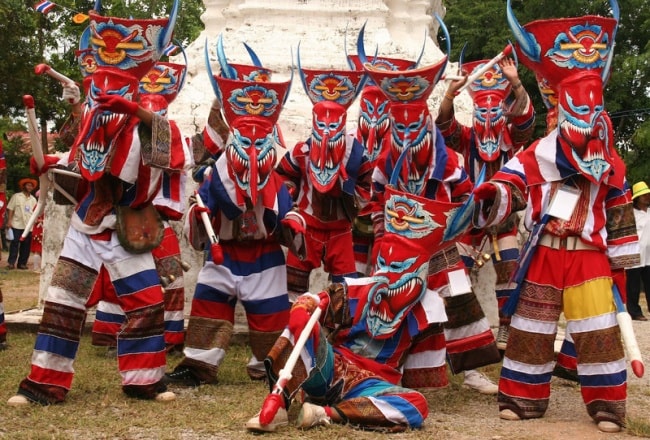
Phuket Vegetarian Festival (the Nine Emperor Gods Festival)
Want to see people pushing knives through their cheeks, setting off firecrackers and walking over hot coals? Oh, and eat some tasty vegetarian food? Then visit one of the most unique Thailand festivals: the Nine Emperor Gods celebration in Phuket. The festival origins are unclear, but it’s thought that a Chinese opera group visited the island many years ago and fell sick with malaria. They miraculously recovered after observing a strict vegetarian diet and praying to the nine Emperor gods.
Nowadays, thousands of people from across Asia visit Phuket for the nine-day festival. Rituals include eating a vegetarian diet to cleanse the body and mind and taking offerings to temples to pray. The more gruesome aspects of the festival, like the body piercing, are practised by mediums to invoke the gods. At the start of the festival, a 10-metre pole is raised to alert the nine gods and participants descend into a trance-like state as they take part in a street procession.
When is the Phuket Vegetarian Festival?
The vegetarian festival takes place on the first nine days of the ninth month in the Chinese Lunar calendar. Hence, the date will be around late October or early November.
Where can you celebrate the Vegetarian Festival?
The festival takes place on the island of Phuket. Although celebrations occur around all 40 of the island’s Chinese shrines, most of the action is around the main temples: Kathu Shrine, Cherng Talay, Jui Tui, Jaw and Bang Niew.
Here is the dedicated article about Phuket Vegetarian Festival
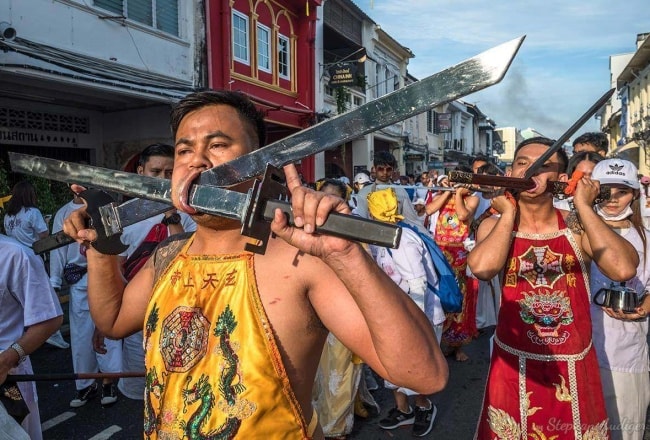
The Lopburi Monkey Buffet Festival
In the Thai city of Lopburi, monkeys rule. Local people revere the long-tailed macaques so much that every year they hold an extravagant feast for them in the crumbly ruins of an old Khmer temple. Over 3,000 macaques attend the banquet of fruit, vegetables and sticky rice, which is laid out on long tables. Before the banquet, Lopburi locals perform songs, speeches and monkey dances in honour of the macaques.
The Lopburi people believe that monkeys descend from Hanuman’s monkey army who, according to legend, saved the wife of Lord Ram from a demon. Since then, monkeys have been thought to bring good luck and are allowed to roam where they please in the city, even if they do cause chaos and tend to mug people. A local Lopburi inn owner, Yongyuth Kitwatananusont, held the first buffet for the monkeys in 1989 and the festival now draws thousands of tourists every year.
When is the Monkey Buffet Festival?
The Monkey Buffet has become known as one of the wackiest Thailand festivals and it takes place every year on the last Sunday in November.
Where can you celebrate the Monkey Buffet Festival?
The Monkey Buffet is held in Lopburi, which is 150 kilometres north of Bangkok. The celebrations start at 10 am at the Phra Prang Sam Yot Temple.
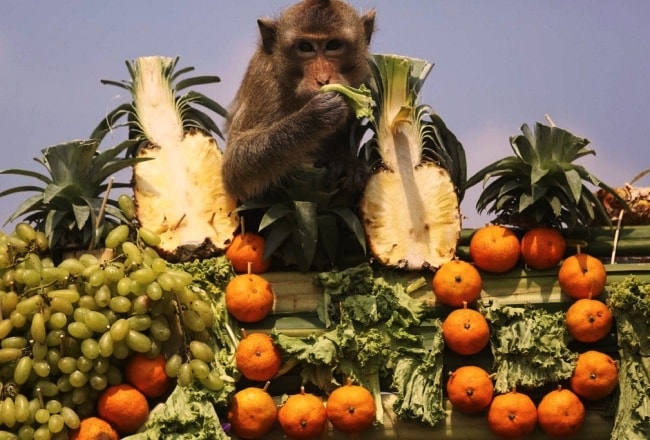
River Kwai Bridge Week
For those among us who are interested in a Thai festival that covers the gruesome history of World War Two, the River Kwai Bridge Week in Kanchanaburi is a highly recommended event. Each year, the events of the Death Railway and the prisoners of war during World War Two are reenacted with plays. These reenacted battles are combined with a spectacular light and firework show. Besides the show itself, several exhibitions are on display as well where you can get a deeper knowledge of what happened in Kanchanaburi’s recent history.
During the River Kwai Bridge Week, the majority of the hotels are fully booked, so booking in advance is highly recommended. The event itself takes place at the Bridge Over The River Kwai and in 2019, there was no entrance fee to attend the event. Right behind the event, northeast from the bridge, there is a large fair where you can enjoy all the street food you could possibly imagine as well as live music performances. A nice little detail: during the River Kwai Bridge Week, the city itself is completely lidded up with all sorts of light creations which is beautiful to watch when driving through the city.
When is the River Kwai Bridge Week?
The River Kwai Bridge Week is held each year at the end of November and the beginning of December. Keep in mind that the reenacting performances are not held on the last day. On the last day of the River Kwai Bridge Week, only the fair is open. In 2020, this is from 28th of November until 7th of December.
Where can you celebrate the River Kwai Bridge Week?
River Kwai Bridge Week is being held at the Bridge Over The River Kwai which is located in the Kanchanaburi Tambon Ban Tai area. To be clear, Kanchanaburi itself is the - third-largest - province. If you are planning to book a hotel during the River Kwai Bridge Week, make sure to select an accommodation in the Kanchanaburi Tambon Ban Tai area or simply near the Bridge Over The River Kwai.
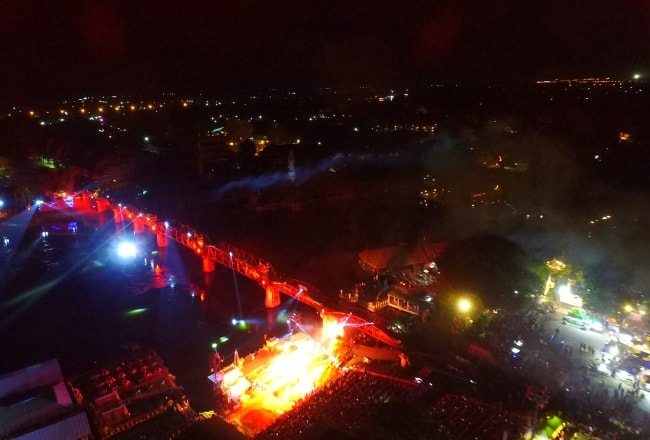
Boon Bang Fai - Rocket Festival
To celebrate the beginning of the raining season, which is hardly needed to grow crops, a rocket festival is being held in the Isaan-region to wake up the sky god Phaya Taen that it’s time to unleash the rain. The celebration of the wet season is common in many cultures all over the world and in Thailand, Boon Bang Fai evolved into a celebration with homemade bamboo rockets, parades, traditional dancing and late-night parties. Boon Bang Fai is being held in many villages all over the Isaan-region, each with slightly different celebrations. The most popular rocket festival, however, is the Yasothon Rocket Festival.
The festival at Yasothon is being held on the weekend and takes three days in total. On Sunday, the competition starts where participants try to launch the missile as far and as long as possible. To prove that this Rocket Festival at Yasothon is serious business: they use homemade rockets that weigh over one hundred kilograms and it will fly over five minutes long. We don’t have to explain to you that this festival can be very dangerous. In the past, people have died or got seriously injured during this festival. If you plan to attend this crazy Thai festival, make sure to take precaution.
When is the Rocket Festival?
The Rocket Festival is being held all over the Isaan-region on different dates around the start the raining season, however, the Rocket Festival at Yasothon is being held on the second Saturday of May.
Where can you celebrate the Rocket Festival?
As said, the Rocket Festival is being celebrated all over the Isaan-region, but the most popular Rocket Festival is being held at Yasothon.
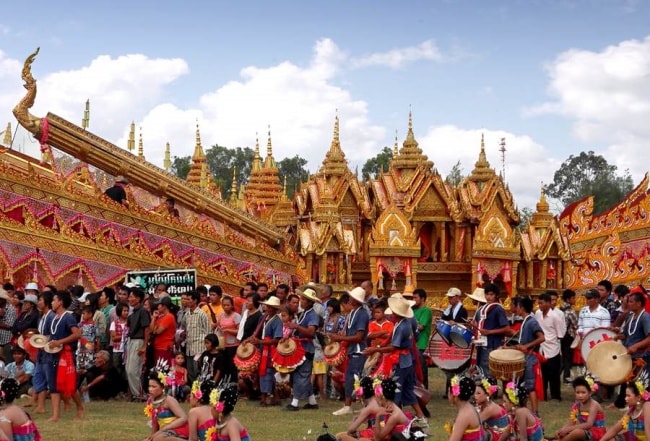
Phimai Festival & Long-Boat Race
One of the older festivals in Thailand is the Phimai Festival, that is being held every second weekend of November. During this five-day festival, homage is given to the more than thousand-year-old ancient city with a daily light and sound show at seven o’clock at night at the ruins of Phimai Historical Park. The light and sound show takes you on a historical journey of King Jayavarman VII. During the five days, there are several activities to do and to watch, including visiting the year market and attending cultural performances. But the absolute highlight is the traditional long-boat race, which is being held on Sunday.
When is the Phimai Festival & Long-Boat Race?
Phimai Festival & Long-Boat Race is being held every second weekend of November. The Long-Boat Race, in particular, is being held on Sunday.
Where can you celebrate the Phimai Festival & Long-Boat Race?
The Phimai Festival & Long-Boat race can be celebrated at the Phimai Historical Park. If you're looking to watch a long-boat race in Thailand: There are several other long-boat races being held in Thailand around September and October as the raining season caused the rivers to be filled with plenty of water again. One of these alternative boat races is being held at Phitsanulok as well as Bangkok. The dates of these events vary each year though.
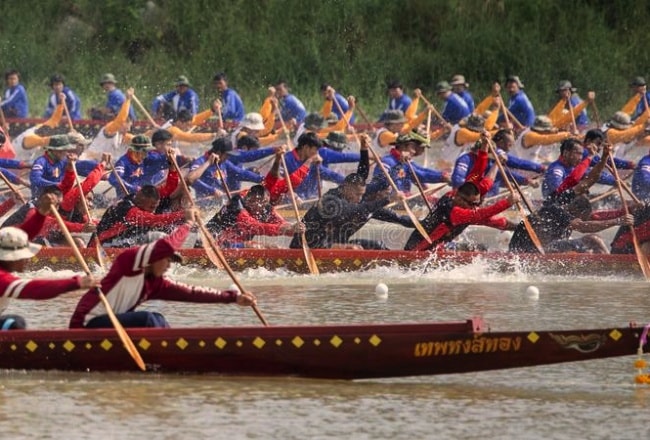
Chinese New Year
Chinese New Year brings one of the most exhilarating celebrations to Yaowarat, which is officially the Chinatown of Bangkok. The narrow, bustling alleys of Chinatown are always a fun place to explore but, during Chinese New Year, things are ramped up a notch.
The entire length of the street (and surrounding alleys) comes to life, with crowds of worshippers, exploding firecrackers, dragon dancers and families of Chinese descent, who gather to partake in the street fanfare as well as enjoy sumptuous Chinese banquets. The best place to experience the festival in Bangkok is at Wat Mangkon Kamalawat on Charoen Krung Street at the northern edge of Chinatown.
- When: January or February
- Where: Chinese/Vietnamese communities
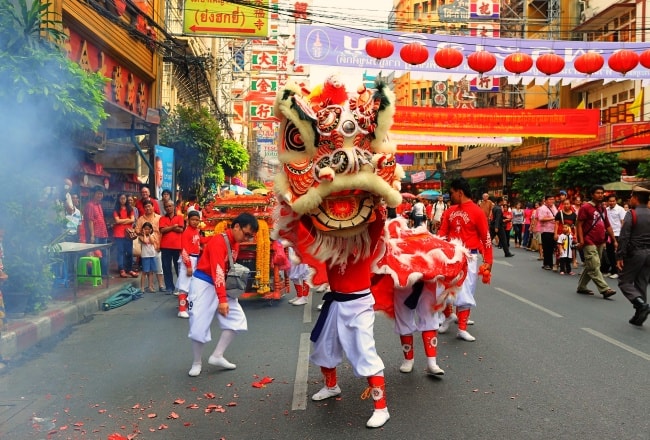
Buffalo Racing Festival (Wing Kwai)
Buffalo racing, and the festivities that go on afterwards make this one of Thailand’s best festivals. This tradition has been taking place for well over 100 years and now brings in the crowds – Thais and foreigners – from far and wide. The racecourse is around 100 metres long, located right in front of Chonburi City Hall. Crowds line the racecourse and cheer on the jockeys, who ride bareback on their trusty beasts. It is amazing to see how fast the massive beasts can actually run!
Chonburi is quite easy to reach from Bangkok, around 1 hour away from both Bangkok and Pattaya. The buffalo racing is the main attraction, but there are plenty more bovine activities to enjoy, such as a buffalo beauty contest, buffalo decorations and Muay Thai demonstrations. There’s a small fair with rides for smaller children, and other fete games – definitely look out for the greasy pole game, which asks participants to climb up the pole to win 500 baht (or try to, at least). While it doesn’t quite compare to the prestige of Ascott, the Melbourne Cup or the Kentucky Derby, Chonburi’s annual buffalo race festival is still a hugely fun day out.
- When: October
- Where: Chonburi
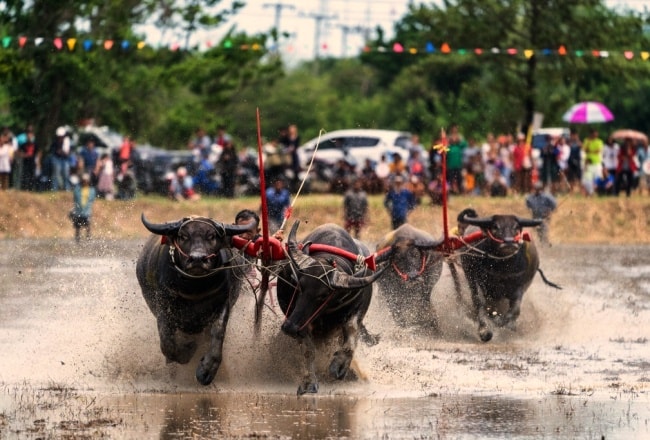
Candle Festival
This large festival in one of Issan’s biggest cities is a nice mix of art, culture and celebration. Up to 10 huge wax sculptures are crafted by international teams of artists, mixing traditional art with more modern, abstract creations. The waxworks are paraded around on floats, accompanied by dancers and traditional folk music.
Principally, this is a religious festival on a sacred Buddhist holiday, when followers donate items to monks, but there's still a party atmosphere throughout the city. Remember that no alcohol is allowed to be sold in Thailand on Buddhist holidays, but it can be consumed. Most locals will stock up the day before and will be discreet about drinking out of respect for monks and devout Buddhists.
- When: July
- Where: Ubon Ratchathani
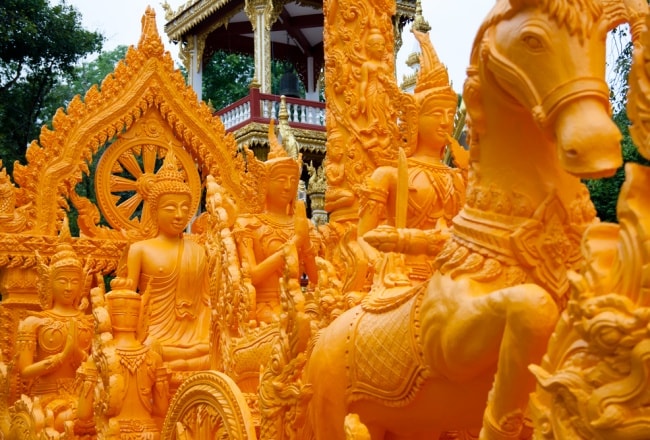
Surin Elephant Festival
As the name suggests, this festival is celebrated for these giant animals of Thailand. Historically, elephants were considered a very pivotal part of Thailand during the battle, agricultural procedures, as well as for traveling. Moreover, the lord Ganesha too is worshipped in the country for apparently the same reason. Celebrated in the northeastern region of Thailand, this festival will let you witness the majestic parade of elephants that are fed heartily with vegetables and fruits. This is one of those Thailand festivals that tourists must attend, for it reflects the cultural as well as historical significance of the country.
- When: 3rd week of November
- Where: Surin Province, Isan, Thailand
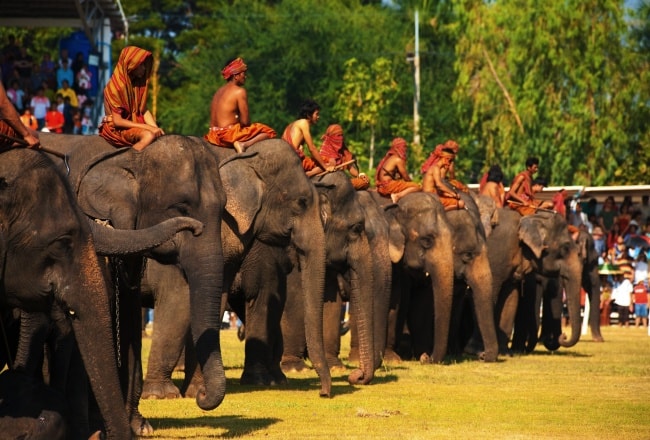
Mekong Naga Fireballs
Want to see more happening Thailand festivals and celebrations? Mekong Naga Fireballs welcomes and attracts people from all around the world. The festival is organized at the bank of Mekong River and one can witness reddish light balls rising into the sky during night that have no sound. Reaching the height of 600 feet, these fireballs rise naturally without any humanly involvement. This is a mystical sight to behold. It is still not discovered as to if this is a scientific phenomenon or some magic.
- When: Mid to late October and early November
- Where: Mekong River
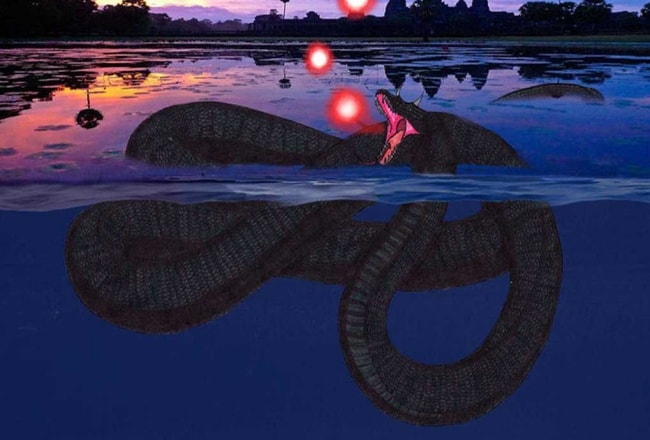
Mother's Day and Father's Day
Mother’s Day and Father’s Day are two festivals that Thais take very seriously. The King and the Queen are the two most important people in Thailand and their birthdays are celebrated every year without fail.
The Queen’s birthday falls on August 12th. The occasion takes on special meaning and Thais will honour both their own mother and their country’s ‘mother’. The day itself is a national holiday and many Thais will spend the day at Temple. However the days leading up to the holiday are also important. Mothers are invited into their child’s school where students will perform a typical Thai dance in their honour. The celebration is a perfect example of the transposable relationship that Thais have with their country and their family.
Father’s Day in Thailand takes on similar properties. The King’s birthday is celebrated on December 5th and all over Thailand homes are decorated with the Thai flag and portraits of the King. Thais love their King, so much so that you can get in serious trouble for speaking ill of him. They wear yellow or gold to mark the occasion and, in Bangkok, whole streets are closed to traffic and elaborate firework displays are held in the King’s honour.
- When: 12th August, Mother's Day | 5th December, Father's Day
- Where: Nationwide
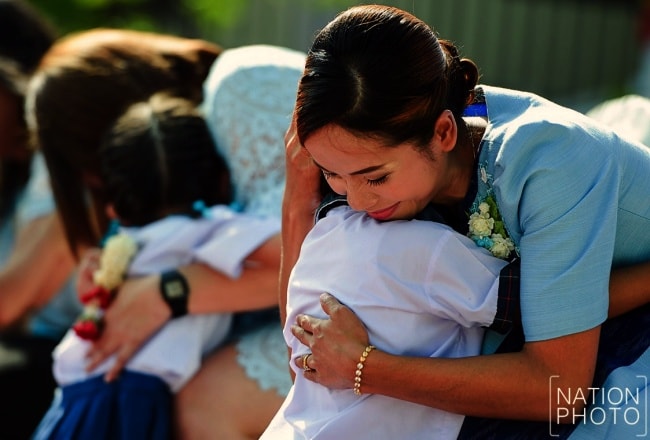
Full Moon Parties
Full Moon parties are the largest beach party in the world. It is an all-night party with 30,000 or more people on the beach each month to dance and play with fire and have a merry time. The vibe is insane. One must experience it once to believe it. Mostly attended by tourists, the full moon parties have grown extremely popular. The area mostly stays busy with people celebrating every phase of the moon. Be a part of one of this great Thailand festivals 2020 and have the best time of your life.
- Where: Koh Pha Ngan (Koh Phangan) island
- When: The night of the full moon, every month of the year
Here is the dedicated article about Full Moon Party in Koh Phangan
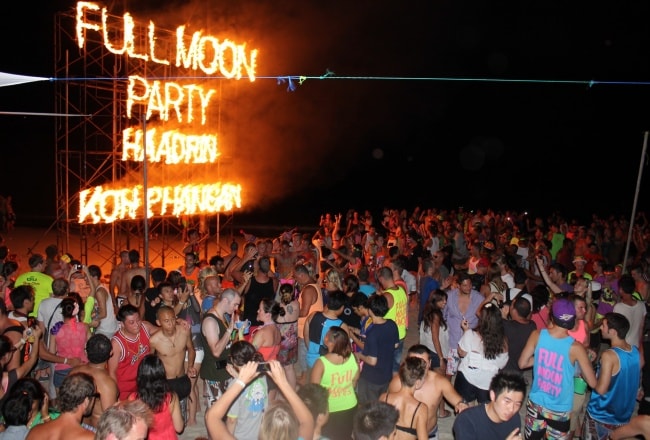
Wai Kru Day
Wai Kru Day is a celebration held in every Thai school throughout the country. It is a day where Thai students show respect to their teachers by presenting them with gifts or flowers. It is believed to be an auspicious day for Buddhists, who believe that the Buddha is the original teacher. The children spend the days leading up to the celebration, which is usually held in June or October, making intricate flower arrangements to present to their teachers. The Teachers line up along the front of the assembly hall and the students, line by line, present their gifts. Whilst it is not a festival that can always be enjoyed by tourists, it can be viewed at Temples throughout the country on occasion and the essentials of respect towards elders is an important theme to bear in mind when travelling in Thailand.
- When: June or October
- Where: Nationwide
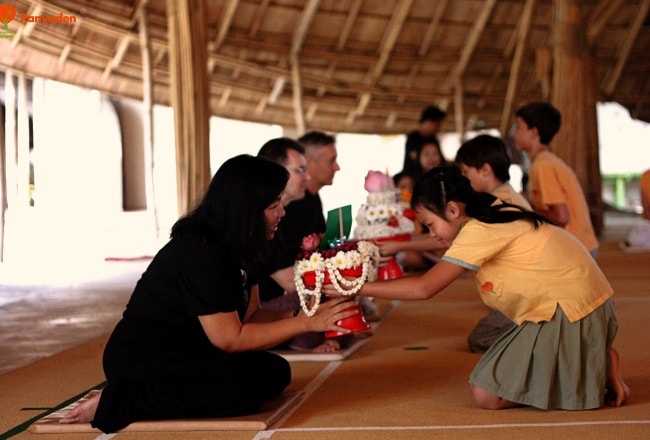
FAQs about Festivals in Thailand
Q. What is Thai New Year called?
A. Thai New Year is called Maha Songkran day in Thailand.
Q. What year is 2559 in Thailand?
A. Thai Calendar is 543 years ahead of Christian calendar. So, the year 2016 is 2559 in Thailand.
Q. What are the festivals in Thailand?
A. Here are some festivals in Thailand that you must experience.
- Yi Peng (Lantern Festival)
- Songkran (The Water Festival)
- Phi Ta Khon (Ghost Festival)
- Boon Bang Fai (The Rocket Festival) .
- Surin Elephant Festival
- Wing Kwai (Water Buffalo Racing Festival)
- Phuket Vegetarian Festival
- Lopburi Monkey Banquet (Food Festival)
Q. What is the most popular festival in Thailand?
A. One of the most popular festivals among Thais has to be Songkran or, as it is sometimes known, the Water Festival.
Q. Where is the Lantern Festival in Thailand?
A. Chiang Mai is the place to be for Loi Krathong (loy kra-tong).
Q. What is the water festival in Thailand?
A. Songkran: Thailand’s Water Festival.
Q. What is Thailand’s national flower?
A. Known locally as the ratchaphruek, the official botanical name of the tree bearing Thailand’s national flower is the Cassia Fistula Linn.
Q. What animal has its own festival in Thailand?
A. Thailand has its own way of celebrating Holi and they call it ‘Songkran Festival’.
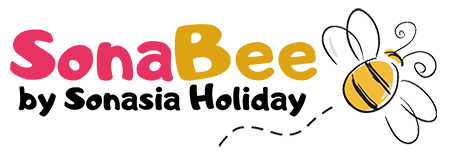
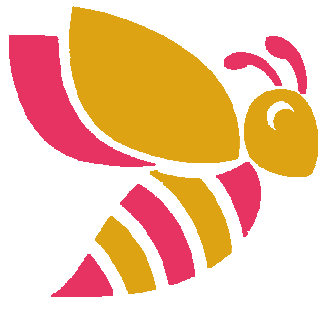




















Jolie LIEMMy name is Jolie, I am a Vietnamese girl growing up in the countryside of Hai Duong, northern Vietnam. Since a little girl, I was always dreaming of exploring the far-away lands, the unseen beauty spots of the world. My dream has been growing bigger and bigger day after day, and I do not miss a chance to make it real. After graduating from the univesity of language in Hanoi, I started the exploration with a travel agency and learning more about travel, especially responsible travel. I love experiencing the different cultures of the different lands and sharing my dream with the whole world. Hope that you love it too!